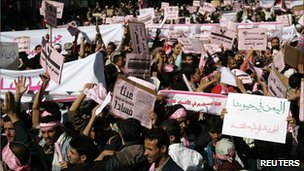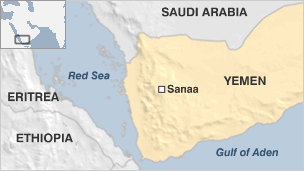BAK
JF-Expert Member
- Feb 11, 2007
- 124,790
- 288,006
Yemen protests: Thousands call on president to leave

Yemen's protests are said to be inspired by the popular revolt in Tunisia
Continue reading the main story
Thousands of Yemenis are demonstrating in the capital Sanaa, calling on Ali Abdullah Saleh, president for more than 30 years, to step down.
This comes after mass protests in Egypt and a popular uprising in Tunisia that ousted its long-time leader.
Yemeni opposition members and youth activists gathered in four parts of the city, including Sanaa University, chanting anti-government slogans.
They also called for economic reforms and an end to corruption.
Yemenis complain of mounting poverty among a growing young population and frustration with a lack of political freedoms.
The country has also been plagued by a range of security issues, including a separatist movement in the south and an uprising of Shia Houthi rebels in the north.
There are fears that Yemen is becoming a leading al-Qaeda haven, with the high numbers of unemployed youths seen as potential recruits for Islamist militant groups.
'Tunisia-inspired'
Economic and social problems
Opposition MP Abdulmalik al-Qasuss, from the al-Islah (Reform) party, echoed the demands of the protesters when he addressed them.
"We gather today to demand the departure of President Saleh and his corrupt government," he was quoted as saying by the AFP news agency.
There have been a series of smaller protests in the lead up to Thursday's mass demonstrations.
On Saturday, hundreds of Sanaa University students held competing protests on campus, with some calling for President Saleh to step down and others for him to remain in office.
Over the weekend, Yemeni authorities arrested prominent rights activist, Tawakul Karman, accusing her of organising the anti-government protests. Her arrest sparked further protests in Sanaa.

After her release from prison on Monday, she told CNN that there was a revolution taking place in her country inspired by Tunisia's so-called Jasmine Revolution.
Protests in Tunisia have ended 23 years of President Ben Ali's rule and ignited unrest elsewhere in the region, including Algeria and Egypt.
President Saleh, a Western ally, became leader of North Yemen in 1978, and has ruled the Republic of Yemen since the north and south merged in 1990. He was last re-elected in 2006.
Yemenis are angry over parliament's attempts to loosen the rules on presidential term limits, sparking opposition concerns that Mr Saleh might try to appoint himself president for life.
Mr Saleh is also accused of wanting to hand power to his eldest son, Ahmed, who heads the elite presidential guard, but he has denied the accusations.
"We are a republic. We reject bequeathing [the presidency]", he said in a televised address on Sunday.

Yemen's protests are said to be inspired by the popular revolt in Tunisia
Continue reading the main story
Thousands of Yemenis are demonstrating in the capital Sanaa, calling on Ali Abdullah Saleh, president for more than 30 years, to step down.
This comes after mass protests in Egypt and a popular uprising in Tunisia that ousted its long-time leader.
Yemeni opposition members and youth activists gathered in four parts of the city, including Sanaa University, chanting anti-government slogans.
They also called for economic reforms and an end to corruption.
Yemenis complain of mounting poverty among a growing young population and frustration with a lack of political freedoms.
The country has also been plagued by a range of security issues, including a separatist movement in the south and an uprising of Shia Houthi rebels in the north.
There are fears that Yemen is becoming a leading al-Qaeda haven, with the high numbers of unemployed youths seen as potential recruits for Islamist militant groups.
'Tunisia-inspired'
Economic and social problems
- Poorest country in the Middle East with 40% of Yemenis living on less than $2 (£1.25) a day
- More than two-thirds of the population under the age of 24
- Illiteracy stands at over 50%, unemployment at 35%
- Dwindling oil reserves and falling oil revenues; Little inward investment
- Acute water shortage
- Weak central government
Opposition MP Abdulmalik al-Qasuss, from the al-Islah (Reform) party, echoed the demands of the protesters when he addressed them.
"We gather today to demand the departure of President Saleh and his corrupt government," he was quoted as saying by the AFP news agency.
There have been a series of smaller protests in the lead up to Thursday's mass demonstrations.
On Saturday, hundreds of Sanaa University students held competing protests on campus, with some calling for President Saleh to step down and others for him to remain in office.
Over the weekend, Yemeni authorities arrested prominent rights activist, Tawakul Karman, accusing her of organising the anti-government protests. Her arrest sparked further protests in Sanaa.

After her release from prison on Monday, she told CNN that there was a revolution taking place in her country inspired by Tunisia's so-called Jasmine Revolution.
Protests in Tunisia have ended 23 years of President Ben Ali's rule and ignited unrest elsewhere in the region, including Algeria and Egypt.
President Saleh, a Western ally, became leader of North Yemen in 1978, and has ruled the Republic of Yemen since the north and south merged in 1990. He was last re-elected in 2006.
Yemenis are angry over parliament's attempts to loosen the rules on presidential term limits, sparking opposition concerns that Mr Saleh might try to appoint himself president for life.
Mr Saleh is also accused of wanting to hand power to his eldest son, Ahmed, who heads the elite presidential guard, but he has denied the accusations.
"We are a republic. We reject bequeathing [the presidency]", he said in a televised address on Sunday.